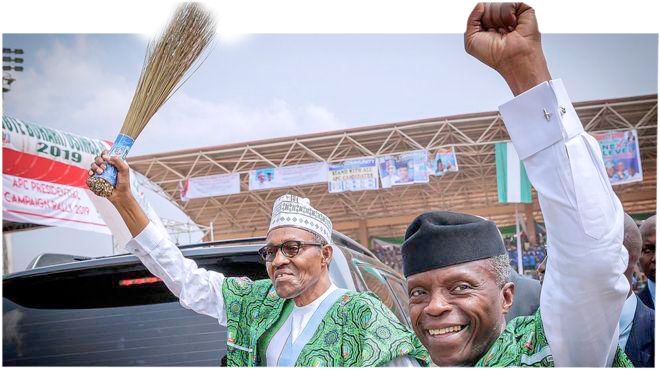
Nigeria’s 72 ‘Presidents’ who occupies Aso Rock after Saturday?
Nigerians will exercise their civic responsibility to elect their president this Saturday, February 16.
Details released by the Independent National Electoral Commission (INEC) of Nigeria indicate that 72 people are contesting the position of president.
The governorship and state houses of assembly polls will take place on March 2.
The Chairman of INEC, Mahmood Yakubu, told the media and other stakeholders at separate fora that there were over 20,000 candidates jostling for positions in the 2019 general election.
Mr Yakubu said throughout Nigeria’s election history, the figure was the highest to be recorded.
Twenty- eight women were also expected to contest in the election as either the main candidate or the running mate.
The leader of the All Progressive Congress (APC) Party, the current ruling party, Muhammadu Buhari, is seeking re-election. He has as his running mate, Yemi Osinbajo.
Opposition Parties
The opposition parties include the People’s Democratic Party (PDP), Allied Peoples Movement of Nigeria, African Action Congress; the Young Progressives Party; the KOWA Party and the Alliance for New Nigeria.
The others are the African Democratic Congress and the National Interest Party, among others.
One of the main candidates in the presidential election Oby Ezekwesili, stepped down because she said she wanted to form a broader coalition to defeat the two main parties.
The presidential election operates according to a run-off voting system.
A candidate needs 50 per cent of the popular national vote to be elected in the first round of voting, as well as over 25 per cent of the vote in two thirds of the states.
If no candidate secures the requires popular-and-state vote in the first round of voting, then the two candidates with the most votes face each other in the second round of voting and the candidate with a simple majority is elected president.
Even though 73 political parties will be fielding candidates in the election, many political observers in Nigeria see the race as a straight fight between President Muhammadu Buhari and Alhaji Atiku Abubakar, a former Vice- President of the country from 1999 to 2007, of the People’s Democratic Party.
Boko Haram
These observers mention factors that were likely to drive Nigeria’s elections as including the Boko Haram crisis and what is referred to as restructuring by Nigerians.
They mention neutrality of key state institutions such as security agencies, INEC and the anti-corruption Economic and Financial Crimes Commission (EFCC) as other driving forces.
INEC’s appointment of Amina Zakari, alleged to be a relative of Buhari,recently to be in charge of collating the results of the election, was recently protested by opposition groups.
Even though scores of schoolgirls that were part of a group of nearly 300 abducted by the militants have also been reunited with their families, many of the so-called Chibok girls remained missing.
Recent attacks by a Boko Haram faction have underscored the fragility of the security gains.
Also, despite a dramatic fall in reported kidnappings in 2016, the level has risen since then, with 310 reported last year.
Violence
Others have also stressed that social and economic inequalities, ethnic and religious divisions and structural weaknesses such as corruption and weak state capacity, remained prevalent across Nigeria and contributed to the risk of electoral violence.
Godfathers
There are several wealthy and powerful individuals, known as “godfathers”, in many states who have the potential to shape and direct the elections or at the very least attempt to do so.
Political commentators see the influence of these “god fathers” as a factor that threatens to increase the risk of violence as they use their resources to incentivise activists who may become, intentionally or otherwise, overzealous and ultimately violent.
At the same time, those who perceive the role of the so-called “godfathers” as unduly influencing the elections may in turn resort to violence in response.
However, there is a general perception that politicians and “godfathers” are the ones manipulating the youth and orchestrating the violence.
EU Mission
Meanwhile, the European Union Election Observation Mission (EU-EOM) is already in Nigeria.
Addressing a press conference at the Hilton Hotel in Abuja last week, the Chief Observer, Maria Arena, said the EU had consistently accompanied electoral processes and deployed an EOM to Nigeria's general election since 1999, reflecting its long-term commitment to supporting credible, transparent and inclusive elections in the country.
Madam Arena pointed out that the mission was completely independent in its conclusions.
Madam Arena explained that the forthcoming elections were such an opportunity for Nigeria to build on what was achieved in 2015 and to further strengthen the country’s democracy.
She said this would be the sixth election observation mission that the EU had deployed to Nigeria.
Aso Rock
Saturday’s election will be crucial to determine which of the 72 ‘Presidents’ will move into the Seat of Government in Abuja known as the Aso Rock.
Attacks by Boko Haram among others, are some of the worrying or unresolved issues that some have mentioned and opined that these could be a hinderance to President Buhari’s chances of winning a second term.
Many are also recounting some of the “good old days” of the early 2000, when candidate Atiku was Vice President under then President Olusegun Obasanjo, as an advantage for Atiku.
With 72 candidates on the ballot and the process of electing a President as enumerated earlier, it is not likely that the results of the polls will be known within just a few days.
Whatever it is, Nigerians as well as other Africans are waiting with bated breadth what the outcome of Saturday’s poll will be.
Is is our expectation that the election will take place freely and without any form of violence.
